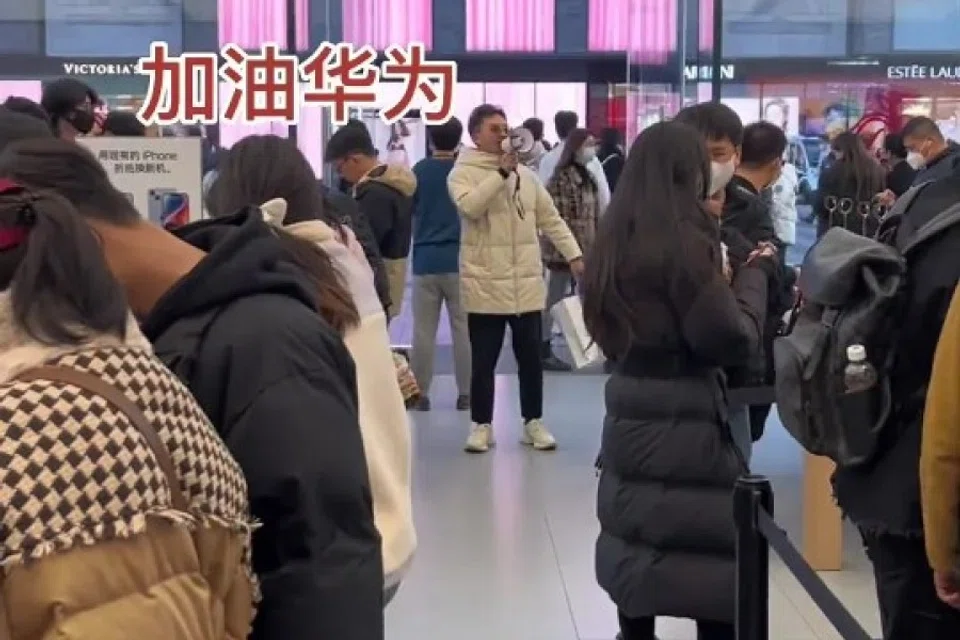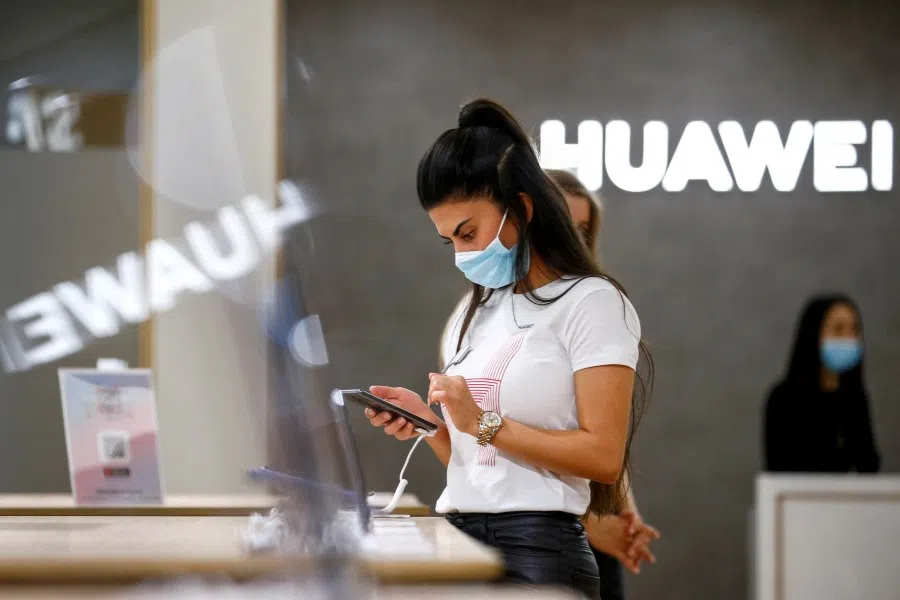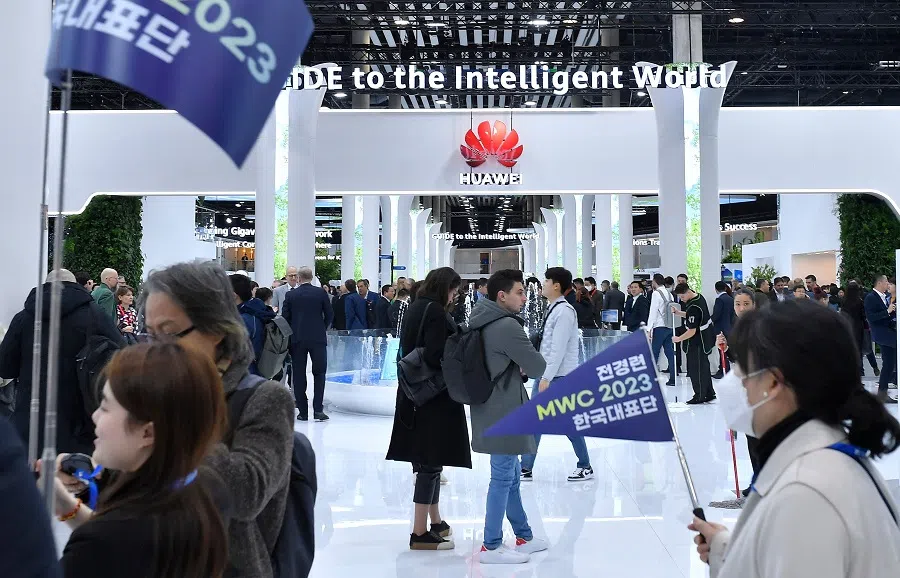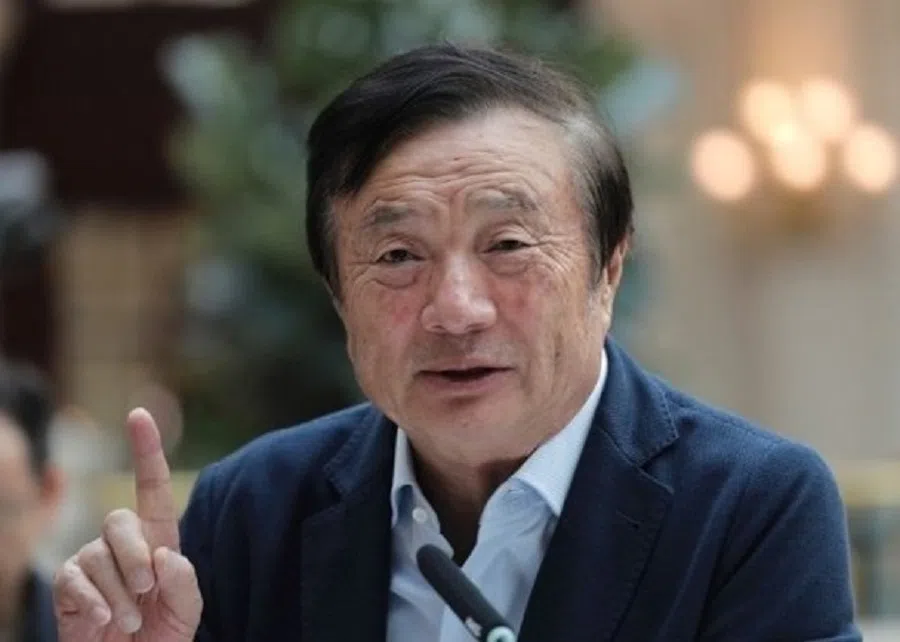Can Chinese patriotism sustain Huawei through tough times?
Can patriotism be taken too far in supporting Huawei or any other China-made product regardless of quality? Does Huawei even need this form of support? Zaobao's China Desk takes a look at Huawei's outlook, as it seems that it needs more than acts of patriotism to tide it over the difficulties it will face in the coming years.

"Jiayou, Huawei! Jiayou, China! Support 'made in China'! It starts with us!"
At the Apple store in Hangzhou, Zhejiang, a young man in his 20s was recorded recently shouting these slogans over a megaphone. Online videos of the incident show the man, who was wearing a white puffer jacket and a pair of matching sneakers, chanting and stopping customers in their tracks with his bizarre action.
No one joined in and the man was asked to leave by a member of the staff. But he continued chanting nonetheless as he was leaving the store.
Misguided patriotism
The incident quickly garnered a wave of reactions over the past couple of days as the videos spread on Chinese social media. Most netizens criticised the man, saying that his annoying behaviour would do Huawei no good.
"Attention-seeking braggart!"
"Such a wannabe patriot. I'm embarrassed even as a diehard Huawei fan!"
"Supporting Huawei doesn't mean abandoning foreign products. If it is a good product, people will support it sooner or later. Such behaviour is small-minded and hampers fair competition."
But others sided with the man. "Right or wrong, we really should support China-made products!"
"With all this talk about opposing the US, why is there no action? Why not start with everyday education?"
Indeed, this is not the first time people shouted slogans supporting Huawei in the Hangzhou Apple store.

Chinese media revealed that the man is a vlogger on a social media platform, and his pro-Huawei rhetoric was in fact a request from his fans. In other words, what seemed like an act of patriotism was actually a media stunt for views and traffic - no wonder many netizens were unhappy.
Indeed, this is not the first time people shouted slogans supporting Huawei in the Hangzhou Apple store.
In September 2021, at the time of the iPhone 13's release, a man shouted slogans supporting Huawei and China-made products outside an Apple retail store with snaking queues of customers. Interestingly, like the latest incident, his shouting attracted some curious looks but nobody paid any real attention and the Apple store remained crowded.
Comments from netizens at the time were also almost unanimous, criticising the man as "blind and brainless". Someone even said: "Playing the patriotism card on a lousy product. I've used Huawei before and the phones basically malfunctioned every six months and I had to change my phone every year. My Apple is still working smoothly right now after three years."
On the US's trade blacklist
The two incidents highlight that some Chinese associate support for Huawei with patriotism. However, the fact that the Chinese - as rational consumers - are still spending money on Apple products also proves Apple's strength.
Figures show that from 2011 to 2021, Apple sold 380 million mobile phones in China. Sales have increased annually over those ten years, from about 10.03 million in 2011 to 50.4 million in 2021.
As for Huawei, domestic sales have dropped since being targeted by the US, from 68.8 million units in 2020 to 29.2 million in 2021. Sales of Huawei mobile phones overseas have also met their Waterloo.

As for Huawei, domestic sales have dropped since being targeted by the US, from 68.8 million units in 2020 to 29.2 million in 2021. Sales of Huawei mobile phones overseas have also met their Waterloo.
In 2019, the US put Huawei on its Entity List, banning most US suppliers from providing goods and technology to Huawei, and limiting Huawei to 4G device components only. By 2021, the US banned foreign semiconductor companies that use American devices and technologies from supplying to Huawei without the approval of the US government. As a result, major chipmakers TSMC, Intel and Qualcomm stopped selling chips to Huawei.
These restrictions dealt a heavy blow to Huawei's mobile phone operations, which was the main source of Huawei's growth. Huawei's earnings in 2021 fell by 29% year on year, to about 636.8 billion RMB, while its earnings in 2022 are expected to be about the same.
To reverse its declining revenue, Huawei has worked on restructuring its semiconductor supply chains in recent years. Last November, Nikkei reported that Huawei has been providing technological support to several local government-funded enterprises including Fujian Jinhua Integrated Circuit Co., which had to halt operations due to US sanctions, and PengXinWei Integrated Circuit Manufacturing Co., which was established in 2021, to build a domestic semiconductor supply chain.
In other words, Huawei wants to escape from the US's technological chokehold.
Diversifying the business
Furthermore, Huawei has been developing a series of new businesses that are less dependent on chips, including cloud computing services, intelligent automotive components, smartphone software and consumer electronics such as smartwatches and tablets. However, The Wall Street Journal reported that these new businesses have yet to offset the steep decline in smartphone sales.
... if the US really imposed a total ban on the sale of US technology to Huawei, the Chinese tech giant's road to recovery will be even more challenging.

According to Bloomberg and Reuters, US Commerce Department official Alan Estevez said on 28 February that the US is evaluating a licensing rule that allows companies to ship certain US technology to Huawei.
Estevez, the under secretary of commerce for industry and security, said at a Congressional hearing that the last Trump administration's export controls were not a total embargo on Huawei, but rather targeted specific categories, allowing products below 5G or cloud technology to continue to be available to Huawei. He stressed that the US Department of Commerce was reviewing the arrangements.
The Wall Street Journal quoted a former senior security official familiar with the matter as saying, "The policy that had allowed exports to Huawei, notwithstanding the entity listing, is being wound down." The official added, "The White House is now telling Commerce, 'Cut off the 4G sales, the time has come to do more pain to Huawei, to try to finish their demise'."
This implies that if the US really imposed a total ban on the sale of US technology to Huawei, the Chinese tech giant's road to recovery will be even more challenging.
Chinese magazine Caijing (《财经》) reported in early February that should the US entirely cut off Huawei from US suppliers, Huawei's terminal business including its carrier, smartphone and personal computer businesses will be directly affected. The report asserted that, while Huawei has been looking for alternatives over the past four years, its three major businesses still rely on US goods or technologies, albeit to varying degrees.
"Stop having illusions and making up fancy tales to trick the company, or any losses will be paid for from your salary." - Huawei founder Ren Zhengfei
Choppy waters ahead
Huawei founder Ren Zhengfei has long foreseen this dilemma.

In August 2022, he reportedly wrote in an internal memo that the company's overly optimistic expectations must be lowered, adding that the priority in 2023 and even up to 2025 was to "survive". He urged the company to try to tide over the difficulties in the next three years, and shift the focus to cash flow and real profits, rather than sales revenue.
He likened the main task in times of crisis to "making blood", that is maintaining operating cash flow to sustain itself.
He added that 2023 and 2024 could give the company some respite to survive, but it remains uncertain if it can break out in these two years. He urged his employees to focus on reality, especially in business forecasting. He warned, "Stop having illusions and making up fancy tales to trick the company, or any losses will be paid for from your salary".
This is not the first time that Ren stressed the importance of "survival". After the US placed Huawei on a trade blacklist in 2019, the company has always focused on "surviving". But this warning is more explicit than previous ones, reflecting Ren's gloomier outlook on Huawei's future amid the economic downturn and intensifying geopolitical competition.
Indeed, as one of China's most globalised enterprises, Huawei is bound to be affected by the tech winter. As the impact of escalating China-US competition intensifies and expands, Huawei will need more than the cheer of a patriotic fan to survive.
This article was first published in Lianhe Zaobao as "华为需要加油口号吗?".
Related: US sanctions forcing Chinese firms to switch to made-in-China tech | Huawei digital talent programme: Another source of China's soft power in Indonesia | China's cloud war: Huawei leading the three-cornered fight? [Part 1] | China's chip industry 'Big Fund' crackdown: Corruptions or failed investments? | Huawei: China's Tesla challenger in the making?



![[Big read] When the Arctic opens, what happens to Singapore?](https://cassette.sphdigital.com.sg/image/thinkchina/da65edebca34645c711c55e83e9877109b3c53847ebb1305573974651df1d13a)
![[Video] George Yeo: America’s deep pain — and why China won’t colonise](https://cassette.sphdigital.com.sg/image/thinkchina/15083e45d96c12390bdea6af2daf19fd9fcd875aa44a0f92796f34e3dad561cc)
